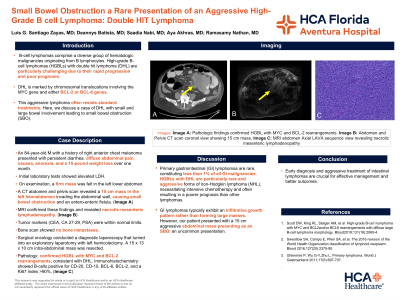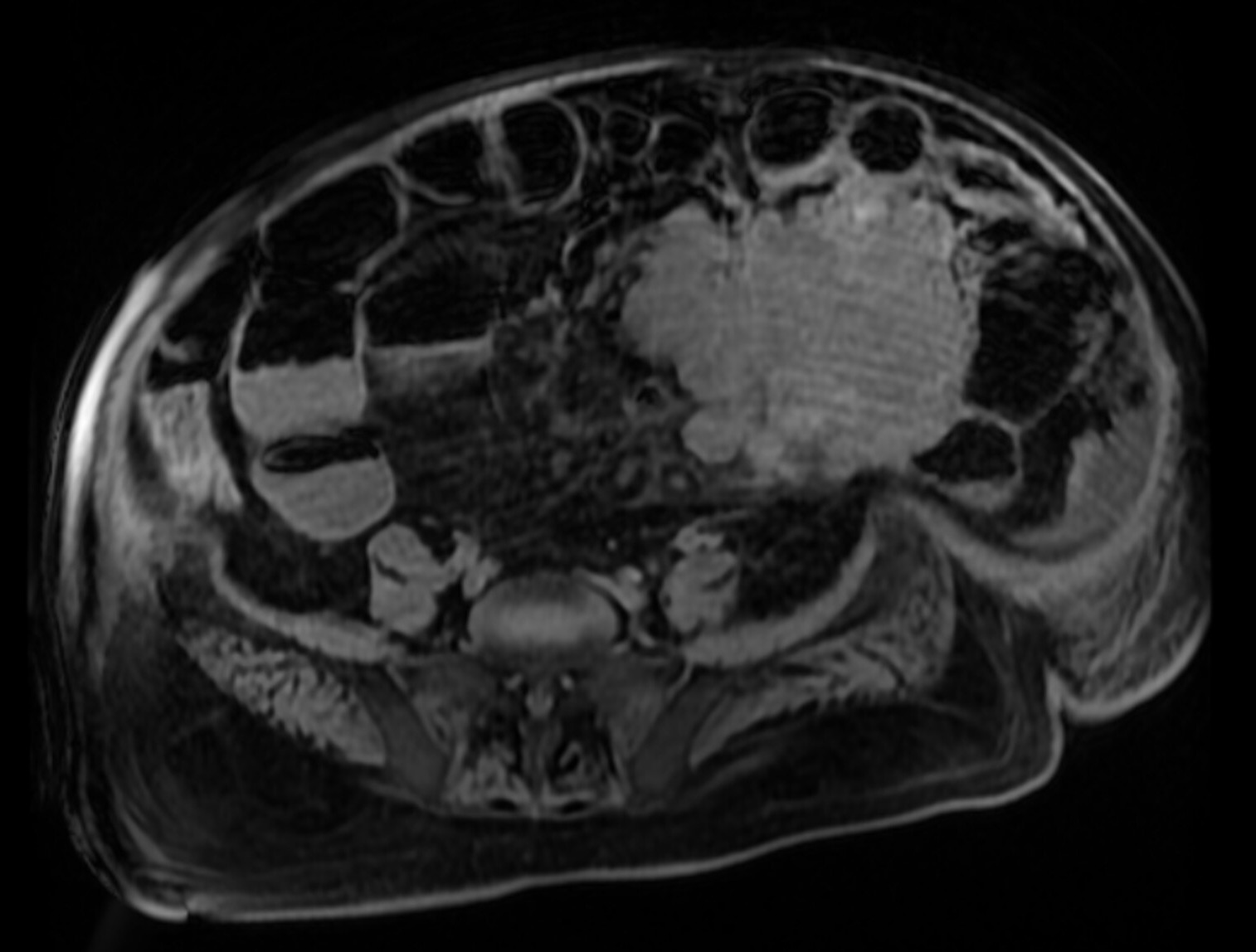Tuesday Poster Session
Category: Small Intestine
P5012 - Small Bowel Obstruction a Rare Presentation of an Aggressive High-Grade B Cell Lymphoma: Double HIT Lymphoma
Tuesday, October 29, 2024
10:30 AM - 4:00 PM ET
Location: Exhibit Hall E

Has Audio
- LS
Luis G. Santiago Zayas, MD
Aventura Hospital
Aventura, FL
Presenting Author(s)
Luis G. Santiago Zayas, MD1, Deannys Batista, MD2, Saadia Nabi, MD1, Aya Akhras, MD1, Ramasamy Nathan, MD1
1Aventura Hospital, Aventura, FL; 2Aventura Hospital, Miami, FL
Introduction: B-cell lymphomas comprise a diverse group of hematologic malignancies originating from B lymphocytes. High-grade B-cell lymphomas (HGBLs) with double hit lymphoma (DHL) are particularly challenging due to their rapid progression and poor prognosis. DHL is marked by chromosomal translocations involving the MYC gene and either BCL2 or BCL6 genes. This aggressive lymphoma often resists standard treatments. Here, we discuss a case of DHL with small and large bowel involvement leading to small bowel obstruction (SBO).
Case Description/Methods: An 84-year-old male with a history of right anterior chest melanoma presented with persistent diarrhea, diffuse abdominal pain, nausea, anorexia, and a 15-pound weight loss over one month. Two months prior, he was admitted with similar symptoms; a CT abdomen and pelvis scan revealed thickened small bowel loops, but he was discharged after symptom resolution. Initial laboratory tests showed elevated LDH. On examination, a firm mass was felt in the left lower abdomen. A CT abdomen and pelvis scan revealed a 15 cm mass in the left hemiabdomen invading the abdominal wall, causing small bowel obstruction and an entero-enteric fistula. MRI confirmed these findings and revealed necrotic mesenteric lymphadenopathy. Tumor markers (CEA, CA 27-29, PSA) were within normal limits. Bone scan showed no bone metastases. Surgical oncology conducted a diagnostic laparoscopy that turned into an exploratory laparotomy with left hemicolectomy. A 15 x 13 x 10 cm intra-abdominal mass was resected. Pathology confirmed HGBL with MYC and BCL-2 rearrangements, consistent with DHL. Immunohistochemistry showed B-cells positive for CD-20, CD-10, BCL6, BCL2, and a Ki67 index >90%. The patient’s condition improved post-surgery and was discharged to follow up with an oncologist.
Discussion: Primary gastrointestinal (GI) lymphomas are rare, constituting less than 1% of all GI malignancies. HGBLs with DHL are particularly rare and aggressive forms of non-Hodgkin lymphoma (NHL), necessitating intensive chemotherapy and often resulting in a poorer prognosis than other lymphomas. GI lymphomas typically exhibit an infiltrative growth pattern rather than forming large masses. However, our patient presented with a 15 cm aggressive abdominal mass presenting as an SBO; an uncommon presentation. Early diagnosis and aggressive treatment of intestinal lymphomas are crucial for effective management.

Disclosures:
Luis G. Santiago Zayas, MD1, Deannys Batista, MD2, Saadia Nabi, MD1, Aya Akhras, MD1, Ramasamy Nathan, MD1. P5012 - Small Bowel Obstruction a Rare Presentation of an Aggressive High-Grade B Cell Lymphoma: Double HIT Lymphoma, ACG 2024 Annual Scientific Meeting Abstracts. Philadelphia, PA: American College of Gastroenterology.
1Aventura Hospital, Aventura, FL; 2Aventura Hospital, Miami, FL
Introduction: B-cell lymphomas comprise a diverse group of hematologic malignancies originating from B lymphocytes. High-grade B-cell lymphomas (HGBLs) with double hit lymphoma (DHL) are particularly challenging due to their rapid progression and poor prognosis. DHL is marked by chromosomal translocations involving the MYC gene and either BCL2 or BCL6 genes. This aggressive lymphoma often resists standard treatments. Here, we discuss a case of DHL with small and large bowel involvement leading to small bowel obstruction (SBO).
Case Description/Methods: An 84-year-old male with a history of right anterior chest melanoma presented with persistent diarrhea, diffuse abdominal pain, nausea, anorexia, and a 15-pound weight loss over one month. Two months prior, he was admitted with similar symptoms; a CT abdomen and pelvis scan revealed thickened small bowel loops, but he was discharged after symptom resolution. Initial laboratory tests showed elevated LDH. On examination, a firm mass was felt in the left lower abdomen. A CT abdomen and pelvis scan revealed a 15 cm mass in the left hemiabdomen invading the abdominal wall, causing small bowel obstruction and an entero-enteric fistula. MRI confirmed these findings and revealed necrotic mesenteric lymphadenopathy. Tumor markers (CEA, CA 27-29, PSA) were within normal limits. Bone scan showed no bone metastases. Surgical oncology conducted a diagnostic laparoscopy that turned into an exploratory laparotomy with left hemicolectomy. A 15 x 13 x 10 cm intra-abdominal mass was resected. Pathology confirmed HGBL with MYC and BCL-2 rearrangements, consistent with DHL. Immunohistochemistry showed B-cells positive for CD-20, CD-10, BCL6, BCL2, and a Ki67 index >90%. The patient’s condition improved post-surgery and was discharged to follow up with an oncologist.
Discussion: Primary gastrointestinal (GI) lymphomas are rare, constituting less than 1% of all GI malignancies. HGBLs with DHL are particularly rare and aggressive forms of non-Hodgkin lymphoma (NHL), necessitating intensive chemotherapy and often resulting in a poorer prognosis than other lymphomas. GI lymphomas typically exhibit an infiltrative growth pattern rather than forming large masses. However, our patient presented with a 15 cm aggressive abdominal mass presenting as an SBO; an uncommon presentation. Early diagnosis and aggressive treatment of intestinal lymphomas are crucial for effective management.

Figure: MRI abdomen with and without contrast, axial view, showing a large soft tissue mass measuring approximately 13.1 x 14.3 cm causing small bowel obstruction.
Disclosures:
Luis Santiago Zayas indicated no relevant financial relationships.
Deannys Batista indicated no relevant financial relationships.
Saadia Nabi indicated no relevant financial relationships.
Aya Akhras indicated no relevant financial relationships.
Ramasamy Nathan indicated no relevant financial relationships.
Luis G. Santiago Zayas, MD1, Deannys Batista, MD2, Saadia Nabi, MD1, Aya Akhras, MD1, Ramasamy Nathan, MD1. P5012 - Small Bowel Obstruction a Rare Presentation of an Aggressive High-Grade B Cell Lymphoma: Double HIT Lymphoma, ACG 2024 Annual Scientific Meeting Abstracts. Philadelphia, PA: American College of Gastroenterology.
